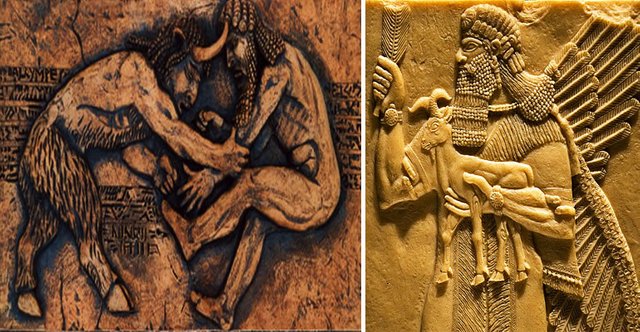Listen To The Epic of Gilgamesh Sung in The Extinct Dialect of Ancient Sumerians

This inspired Canadian singer interprets the Epic of Gilgamesh in the original language of its makers, a dialect dead for over 4,000 years.
More than 4,500 years ago, the Sumerians had created an elevated society with advanced notions in numerous fields. Their kingly heritage includes a well-established writing system, advanced concepts of astronomy and mathematics, unique architecture and arts, together with various cuneiform writings reminding of ancient heroes and demigods.
Among these texts is the Epic of Gilgamesh, an ancient poem from Summer – “the land between rivers,” that has often been regarded as the earliest surviving great work of literature.
Sumerian as a language almost died out in 2,000 BC, and was mostly used by scholars, similar to how Latin is today. Nobody knows how it was pronounced since it hadn’t been heard in 4,000 years.
With such a wealthy culture, modern man has craved to taste or at least have a glance at how life ran its course in ancient Summer. After identifying some of their traditional instruments and learning this now-defunct language, Canadian artist Peter Pringle has brought to life his version of the Epic of Giglamesh in an epic song. (careful, it gives goosebumps)
"What you hear in this video are a few of the opening lines of part of the epic poem, accompanied only by a long-neck, three-string, Sumerian lute known as a “gish-gu-di”.
The location for this performance is the courtyard of Nebuchadnezzar’s palace in Babylon. The piece is four minutes long and is intended only as a taste of what the music of ancient Summer might have sounded like.
Protagonist of the story is Gilgamesh, king of Uruk, and his wild companion Enkidu. Together, they venture on an endeavour to discover the secret of eternal life, but the hero ends up realizing that “…life, which you look for, you will never find, for when the gods created man, they let death be his share, and life withheld in their own hands.” During his journey, Gilgamesh comes across the immortal man Utnapishtim who tells him about the upcoming “Great Flood.”
It’s possible that the myths encountered within depict real events that had happened before the great deluge. The surviving stories were transmitted to the following generations and were eventually put into writing. Thus, the Epic of Gilgamesh could be a fragment of history spouted from the minds of our ancient forefathers that had escaped unharmed after the cataclysmic flood.
In turn, this would transform the mythical creatures and deities from the Sumerian poem into veritable beings that had lived in long-forgotten times, more than 12,500 years ago as accounts of the last glaciation suggest. A world deluge would have wiped out countless breeds of both animals and humans, and those fortunate enough to survived have glued together and further transmitted long-forgotten knowledge of those immemorial times and peoples.
Envisioning the ancient history of humanity in a broader timeline could also explain the tremendous lifespan of some of the Sumerian kings, while the Anunnaki story would make more sense due to the large timetable that pushes the plot closer to the day when gods walked among humans. Since there are no recorded artifacts recovered from those timeworn days, we can only let our imagination and instinct wonder.
In case you’e enjoyed the unique representation of the Epic of Gilgamesh by Canadian artist Peter Pringle, I’ll leave below a remastered version of the epic song. Don’t forget to spread the word about this awesome work of art!
https://soundcloud.com/dietonzentrale/the-epic-of-gilgamesh-in-sumerian
@cryptohustlin has voted on behalf of @minnowpond. If you would like to recieve upvotes from minnowpond on all your posts, simply FOLLOW @minnowpond. To be Resteemed to 4k+ followers and upvoted heavier send 0.25SBD to @minnowpond with your posts url as the memo
Beautiful. The song evoked a haunting feeling. Love it. Upvoted and resteemed.
I'm glad you've enjoyed it! Make sure to listen to the remastered version on soundcloud at the bottom of the article